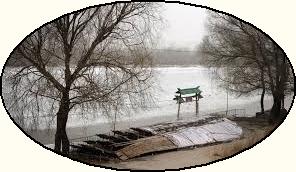Spadina Literary Review — edition 7 page 24
.../
Once across, the pair has no better plan than to knock on the nearest door. Jang pays a farmer $700 to guide them to the city of Yanji, 65 km from the border. And, wouldn't you know it, the farmer has a nephew who has a South Korean spy connection. But by now the North Koreans are on the case and have broadcast the lie that Jang and Young-min are wanted for murder. For a few days the two loiter around the outskirts of Yanji, hiding on a hillside on sub-zero nights, waiting for the farmer’s nephew to show up.

The Tumen River from the Chinese side
Jang Jin-sung as author takes this opportunity to interweave some anti-Kim material. He has a disconcerting way of switching from casual dialog to dogged polemic in the blink of an eye.
Now, personally, a blunderer like Jang's buddy Young-min would not be my first choice as a co-defector, but from an authorial point of view the irresistible thing is that Young-min worked for the “Joy Division” that cared for Kim’s “personal needs,” so he’ll have a salacious tale to tell. Kim is said to have had an eye for the girls, and according to Young-min, special cadres scoured North Korea in search of the prettiest virgins to populate Kim’s villas.
Jang has scandals to relate too, based on his researches into the Kim family. Most of all — Jang must consider this a real shocker, since it consumes an entire chapter — Kim did not inherit his leadership from his father, as North Korea's official history has it, but rather swiped it away from him in a court intrigue worthy of the ancient pharaohs.
Kim was Kim Il-sung’s son by his first marriage but Kim Il-sung and his cronies preferred the son by a second marriage, Kim Pyong-il, to be the next leader. Kim was therefore relegated to a propaganda post in the ironically named Korean Workers Party, the North’s perpetual ruling party. Kim, however, used his position slyly. He set about turning his father into a cult figure, a veritable god of the North Koreans, who were henceforth dubbed “Kim Il-sung’s people.” This cultification of his father advanced Kim’s own power, for Kim was now in a position to purge or cause to be purged those rivals who did not worship his father hard enough. Kim climbed to the top of the party, eliminating opponents one by one, replacing them with his own appointees. By 1980 he commanded the entire government including the secret police, while his father had become a mere figurehead, unable even to see visitors without his son’s approval.
I won’t get into all the ups and downs of Jang and Young-min in China. Some ordinary people were brave enough to feed and hide them, while others, including some evangelizing Christian churches, chased them away. Despite close calls, the pair managed to stay a step ahead of Chinese police. But they decided to split up and travel separately rather than so obviously match the description of a couple of alleged murderers.
When Jang reached Shenyang, 200 km from the border, he learned that Young-min had been caught by the Chinese authorities and committed suicide rather than be transported back to North Korea.